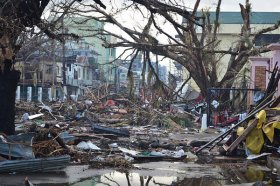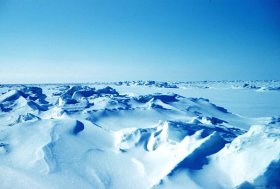Can we stop global warming?
 Scientists become increasingly stark about the choices facing humanity on global warming
Scientists become increasingly stark about the choices facing humanity on global warming
Debris in Tacloban, Philippines after devastating Typhoon Haiyan. Higher storm surges due to climate change are worsening damage from hurricanes and other tropical storms. Photo by: Trocaire/Creative Commons 2.0
Twenty-six years after the founding of the Intergovernmental Panel on Climate Change (IPCC), the Nobel Prize-winning group of scientists and world governments has released a new synthesis report that warns in its strongest tones yet that climate change must be dealt with. None of the findings are surprising—they have been released in earlier assessments throughout the year—but the terms in which they are written are the starkest yet, especially given this is coming from the conservative scientific community.
“Warming of the climate system is unequivocal, and since the 1950s, many of the observed changes are unprecedented over decades to millennia. The atmosphere and ocean have warmed, the amounts of snow and ice have diminished, and sea level has risen, ” reads the new synthesis report, which notes that it is “extremely likely” humans are the major driver behind current global warming, i.e. scientists are 95 to 100 percent certain.
The report finds that global warming will likely continue for centuries, even if greenhouse gas emissions dropped to zero today. Yet humanity now has to decide between a pace of warming that human society—and much of nature—can adapt to and one that wreaks irreversible harm.
Coral reefs, like this one in Australia’s Great Barrier Reef, may be hugely sensitive to ocean acidification and marine warming. Coral reefs are the most biodiverse ecosystems in the oceans. Photo by: Richard Ling/Creative Commons 3.0.
Photo by: Richard Ling/Creative Commons 3.0.
“Warming by the end of the 21st century will lead to high to very high risk of severe, widespread, and irreversible impacts globally, ” reads the report, in its strongest statement on this to date. It also notes that impacts are not far-flung in the future, but already being felt around the world.
However, the report was not all gloom-and-doom. Instead, it noted that humanity—and their governments—have a clear choice regarding the future.
“We have the means to limit climate change, ” R. K. Pachauri, Chair of the IPCC, said. “The solutions are many and allow for continued economic and human development. All we need is the will to change, which we trust will be motivated by knowledge and an understanding of the science of climate change.”





